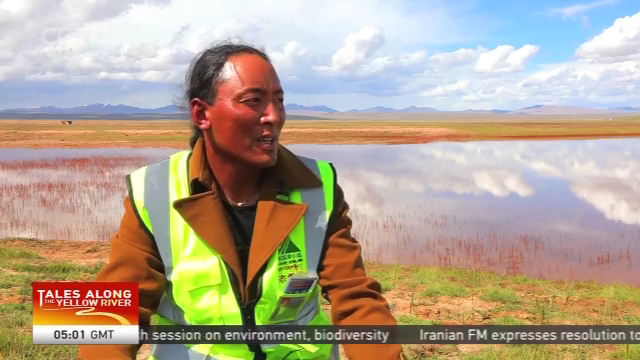
14:33, 26-Aug-2019
Tales Along The Yellow River: Qinghai herdsmen devote themselves to protecting the ecosystem
Updated
15:04, 26-Aug-2019

Our first episode takes us to the northwestern province of Qinghai, where the Yellow River begins. Reporter Cui Hui'ao visited Maduo County of Guoluo Tibetan Autonomous Prefecture. Thousands of herdsmen there are going the extra mile to protect the source of the river. Let's have a look.
This is what Suosuo has been doing for years - picking up trash wherever he goes. Three years ago, he was hired by Maduo County as a park ranger. Along with 3-thousand other rangers, Suosuo walks for miles each day, making sure the area around Zhaling Lake is clean and protected.
SUO SUO PARK RANGER "In the Tibetan language, 'Zhaling Lake' means 'Long Grey Lake'. It is the source of the Yellow River, and our job is to protect it, just like how we protect our eyes."
However, it wasn't easy for Suosuo to ease in to his new job. Like most Tibetans in the area, he grew up to become a herdsman. But, since 2016, grazing has been banned on the Sanjiangyuan grasslands as land degradation was once over 60 percent. Herders like Suosuo had to relocate to urban areas.
SUO SUO PARK RANGER "We didn't want to move away at first because pasturing was our life, as well as our only source of income. But we resettled ourselves to make way for the environment."
Now Suosuo, his wife and their three children live in a newly built community. He receives a monthly subsidy of 1,800 yuan for collecting garbage, which is about 260 dollars. He says his life has improved.
CUI HUI'AO ZHALING LAKE, QINGHAI PROVINCE "Maduo County is known as 'the land of a thousand lakes'. However, some of the lakes went dry and disappeared in the 1980s due to environmental damage and drought. But now, thanks to years of environmental control efforts, some major lakes have been restored with the water levels increasing."
Mining, logging, and hunting are no longer allowed. Last year, authorities banned all tourist activities in core areas of the park. Tourism facilities were shut down. More trees were planted, and grasses were grown. Bit by bit, these efforts finally paid off.
SUO SUO PARK RANGER "The most visible change is the return of wild animals. We can often see Tibetan antelopes, wild donkeys, wolves and foxes around the lake. They now live here without human interference."
Suosuo says the shift from grassland pasturer to park ranger has fundamentally changed his life. His new job brings him back to nature. Compared with pasturing, the hours are longer. But he says it's all worth it, as this new role benefits his homeland and future generations of his people. Cui Hui'ao, CGTN, Maduo County, Qinghai Province.
SITEMAP
Copyright © 2018 CGTN. Beijing ICP prepared NO.16065310-3
Copyright © 2018 CGTN. Beijing ICP prepared NO.16065310-3